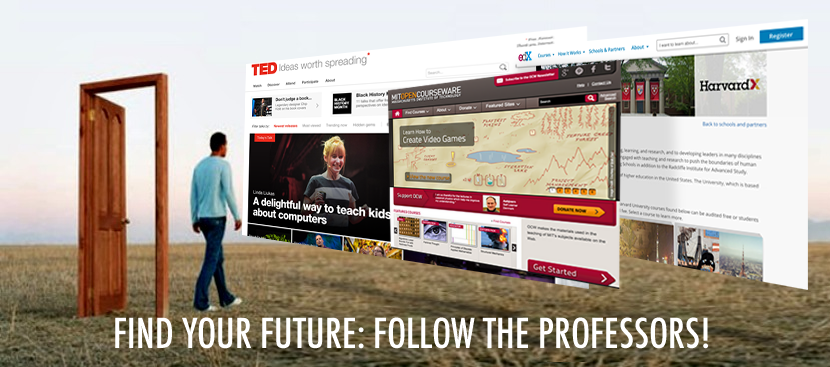
There is no school in this world whose buildings make it great, although Edifice Complex, their cool new business school or the new gym, is generally how most colleges and universities are sold to prospective students, along with sports programs, school history and successful alumni.
The problem when you use those yardsticks is that you’re picking a school the wrong way. Using the rearview mirror of what a school was, the “better dorms make better schools” approach, or the follow-your-favorite-football jersey may not land you in a place where you get the education that you need in the thing that you’re passionate about doing with your life.
All colleges and universities are really no better or worse than their faculty, which changes over time quite a bit. Some schools get materially better, while others tread on past glories. Even a school that has exceptional faculty in one department may have really lousy faculty group in another. So how do you figure this part of the puzzle out?
The old school way was disillusionment in what you signed up to do, and usually a change of major, if things didn’t work out. Today, we have the Internet, which gives us a couple of important research tools.
Academics PUBLISH and TALK. They lecture on videos, audio for the web, radio and show up on television on the news or in a documentary. That is what gives them their street cred.
Find a subject that you’re interested in, and listen to a professor talk about it, and/or read one of their papers on it. If something that they’re doing excites you, they teach somewhere. Or even if they’ve stopped, they have had graduate students, many of whom contribute to research papers, that have gone on to teach.
Here is where you look:
Video/Audio Lecture Resources
- TED talks – One of the best places to hear about new ideas and learn more about the people making them happen.
- iTunesU – Already on Apple cell phones and iPads, you can take actual coursework at some of the nation’s top universities and try it on for size!
- BigThink – Videos on topics of interest from some of the top people in fields as diverse as particle physics and comedy;
- Academic Earth – Curated lectures from some of the top universities in America.
- OpenCulture – Videos and audio lectures from some of the top faculty in the world;
Published Papers
- Academia.edu features the papers of more than 31million academics, professors, grad students, doctoral candidates and students;
- Google Scholar – Another vast collection of knowledge from a wide range of academics.
- The National Archives – The federal government’s library stores an immense number of published papers on an infinite variety of subjects;
- Arxiv.org – A resource page at Cornell University that directs you to academic papers in math, physics, computer science, quantitative biology, quantitative finance and statistics.
- RePec – Interested in economics? Then this is your resource.
- PhilPapers – Philosophy may not sound like a “concrete” career path for most parents, but there are CEOs who were philosophy students as undergrads. Philosophy, and classics need students, and are often a priority entry point in a competitive university or college because fewer students elect to major in them, largely because of parental concerns about practicality.
- SSRN – The Social Science Research Network is hosted by some of the world’s best academic institutions to showcase the top scholarly thinking in the social sciences. Sociology is a rapidly growing field for undergraduate study, because its understandings of human interaction, cultural, racial and gender studies, are important to the new world.
FREE Online Courses at the College/U
They’re called MOOCs, Massive Open Online Courses. Several colleges and universities, and a few online academic groups, put their courses online, free. Not only is it a great learning experience, but you get to try on the department and faculty and see how they fit! Many colleges have MOOCs. You can search for “[College name] Free online courses” and get ones from the schools of your interest. Some of the more established, and better known ones, as well as directories of the courses or the sites, are available below:
- EdX – EdX sponsors some of the most elite schools’ online programs, including Harvard.
- Class Central – Includes several popular schools including the University of Michigan, Harvard, University of Pennsylvania (Penn), etc.
- Coursera – Another site that aggregates different top schools, including Johns Hopkins, Emory, Duke, University of California at San Diego, and others.
- MOOC-List – A list of current courses from a variety of sources
- MIT OpenCourses – The Massachusetts Institute of Technology (MIT) offers a comprehensive course catalog free to the public;
- OYC – Open Courses at Yale University ;
- Carnegie Mellon Open Learning Initiative
- Online Stanford – Stanford’s free online curriculum;
- Notre Dame
- University of California – Berkeley (CAL) – One of the top colleges in the country offers courses for credit and no credit;
- University of Florida (UF) – More of a credit system that is an extension of the university’s campus, but they offer some classes free that you can “try on.”
Discover those people. Find out where they teach.
Then you can drill down on their school’s website to their department and see what they are doing at their school currently.
Not enough information provided by their U. or college? Email the professor! Tell them you were very interested in their research, and that you were thinking about applying to their school, and ask if that is what they are working on. What is the ability of an undergraduate to participate in more advanced research projects on that subject?
Network and communicate, without overstepping your bounds. Send a query to them ONCE. If the professor replies, and is welcoming of your attention, AND encourages you to communicate with them, continue. If they are very terse in their response, or do not reply, then you have your message. That may also be a sign that this may not be the best faculty fit for you in your area of interest.
If they do open up a dialogue, ask if there are any opportunities to participate in summer work or studies. If the professor takes a liking to you, you might even find a recommendation sent to the admissions office on your behalf, although you should not, as a part of this process, expect it. It’s just icing on the cake.
Your real mission here is to see who is out there who can teach you something which puts you on a pathway into your area of interest, and helps you weed out your short-list of colleges.
How to get started? Listen to a Ted talk. Take a class. Frequently, a performing arts school’s schedule is not deep in homework. On a day where you have a lighter schedule, pass on the video game or the social site for a couple of hours and check out doors to your future!

Pingback: Picking Schools: The Long List | The College Music Advisory Service
Pingback: Researching Schools: How to Research The Professors – Part II – TaDa!Education
Pingback: Don’t Let the Supplementals Make You MENTAL – TaDa!Education
Pingback: Picking Schools: The Long List – TaDa!Education
Pingback: Picking Schools: Short Lists – TaDa!Education